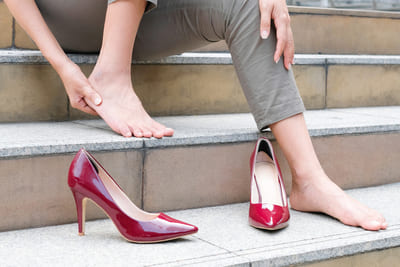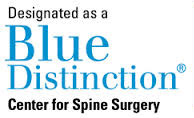What Do Shoes Have to Do with Back Pain?
 More than you might think. Remember that old children’s song, Dem Bones?
More than you might think. Remember that old children’s song, Dem Bones?
The leg bone’s connected to the knee bone, the knee bone’s connected to the thigh bone, the thigh bone’s connected to the hip bone…
That’s the basic idea behind the connection between what you wear on your feet and the back pain you might be experiencing. Because the wrong shoes can cause harmful chain reactions. Your pelvis might begin to tilt, applying pressure on your back. Your heel might be at a level below the level of the toe, rotating the pelvis. There might be too little shock absorption, cushioning, or arch support. All these factors can lead to back pain.
Therefore, you want to avoid wearing shoes with entirely flat soles. Think here of flip-flops, ballerina flats, house slippers, and moccasin-style loafers. They press the heel below the level of the toes, which can rotate your pelvis, misalign your spine and lead to back pain. You also want to stay away from shoes without shock absorption, like really thin-soled shoes, because they don’t absorb shock which can result in back pain.
The overall point to understand is that our feet, along with the head, neck, back, lower back, hips and legs form a connecting chain of parts that help control or regulate movement, balance, posture and the way we walk and move. An imbalance in one of the links of this chain can have an effect on any or all of the other links. And this is why issues with our feet can trigger back pain or prolong back pain.
So, when you are choosing your next pair of shoes, here are some things to keep in mind:
- Check with your doctor or a podiatrist to see if your current shoes need orthotic insoles to help give you the right support and comfort.
- Choose shoes that have some inbuilt cushioning to lessen the impact on your feet.
- Avoid high heels as much as possible.
- Avoid flats
- Avoid loose or tight shoes because they can negatively affect your gait.
